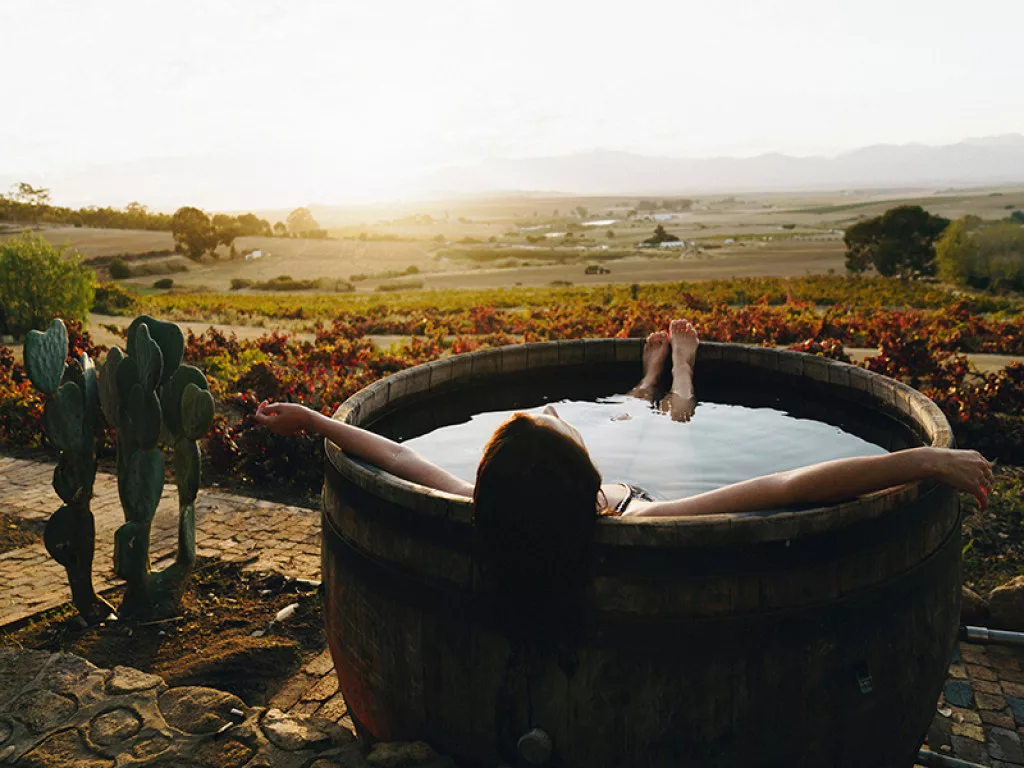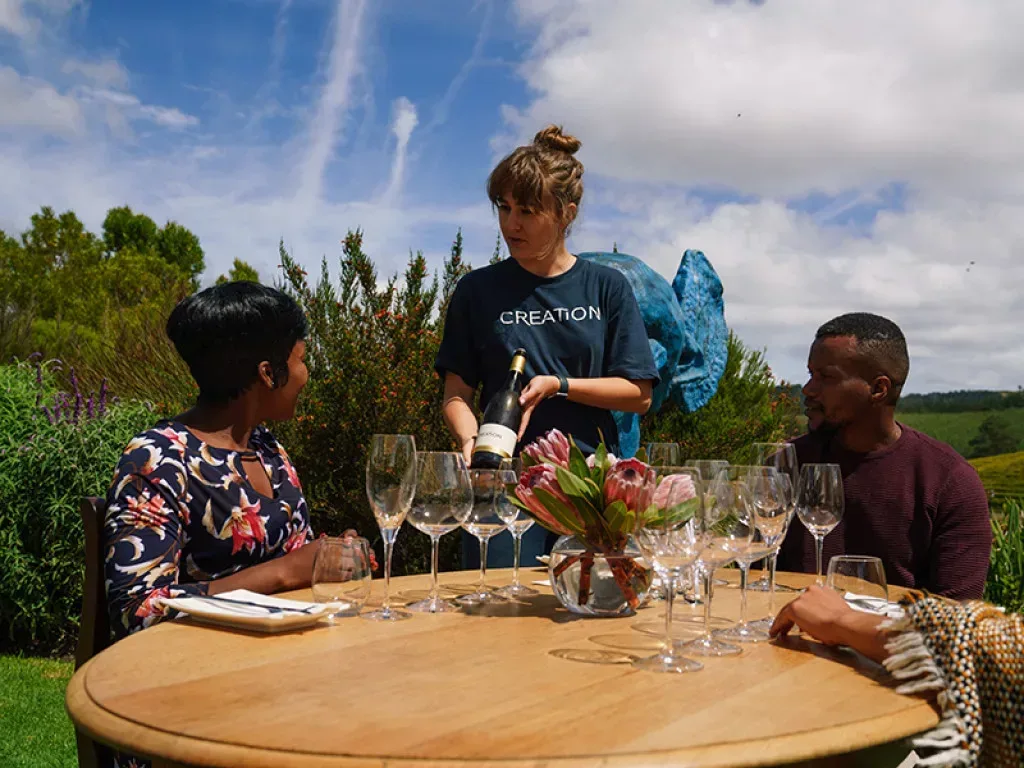SOUTH AFRICA’S WESTERN CAPE
Hugging the coastline on the southernmost extremity of the continent, the Western Cape is the jewel in the crown of South Africa’s provinces. From the wild plateaus of Karoo to the rich Atlantic fishing grounds of the Cape Peninsula, the area is renowned as road-trip territory, with the scenic ‘Garden Route’ stretching from Cape Town to Port Elizabeth.
Journey upland from the South African ‘Mother City’, and you will encounter fertile microclimates enclaved by mountain ranges where the bounty of the Western Cape is best enjoyed over a glass of wine. The extensive ‘Winelands’ are truly an oenophile’s paradise, offering produce nourished under rich African soil, with Stellenbosch and Franschoek standing as the two main havens since their foundation under Dutch settlement in the 17th century.
Wilderness abounds in the Western Cape and wildlife is never far at hand. Birdlife flourishes in sheltered estuaries alongside the rolling breakers of seas abundant with marine life, where sightings of whales are guaranteed from the shores of Hermanus and lurking Great Whites may tempt cage-divers. Inland, game drives in world-famous destinations such as Kruger National Park reveal glimpses of the notorious Big Five.
With a renewed appeal for the digital nomad movement and a popular scene for wellness experiences, the panoramas of the Western Cape are the ideal post-pandemic antidote. Showcasing such epic variety, it is unsurprising that the region has earnt itself the title of ‘a World in one Province’.
TOURISM INSIGHTS: WESGRO
As the tourism, trade and investment promotion agency for Cape Town and the Western Cape, Wesgro is the official body to guide travel, investment, film, and exporting across the region. With sector spanning expertise, Wesgro is dedicated to ensuring successful investments and opportunities for both foreign investors and local exporters in an area of South Africa that is truly unlimited in its potential. Since the organisation’s foundation in 1983, the company has been dedicated to the pursuit of marketing the Western Cape as an attractive international hub for both business and travel. We sat down with the Head of Leisure Tourism, Julia Louw from Wegro’s Cape Town headquarters to find out more.
Q&A WITH JULIA LOUW, HEAD OF LEISURE TOURISM, WESGRO
Can you talk us through the origins of Wesgro and its initial vision?
Julia Louw, Head of Leisure Tourism (JL): Wesgro is the official Tourism, Trade, Investment and Film Promotion Agency for Cape Town and the Western Cape – the first point of contact for foreign investors and local companies. The agency attracts and facilitates national and international investment, works to grow exports of products and services, and markets the Cape as a competitive business and travel destination.
Additionally, Wesgro assists the regional government with its economic growth and job creation agenda and helps companies to secure and expand investments in the region to become export-ready, by facilitating entry into foreign markets, either through outward foreign direct investment (FDI) across the continent or outward global missions across a range of sectors and countries.
How do you market Cape Town and the Western Cape as both a business and leisure travel destination?
JL: Cape Town and the Western Cape is what we like to call a ‘World in One Province’. There is so much on offer within the destination – that makes it very easy to market. From a business perspective, we have state of the art conference facilities within the province, and to add to the business experience, we have incredible sensory and community experiences to increase the conference/business event attendees’ enjoyment of the destination. This seamlessly feeds into the leisure aspect, as you will often find a business delegate returning to the destination but as a leisure traveller with his family and friends.
Are there any interesting projects either ongoing or in the pipeline that Wesgro wish to highlight?
JL: Looking to stay top of the consideration list in key overseas markets, the international ‘Neverending Tourist’ campaign was launched. The digitally led campaign demonstrates how the region is the perfect antidote to lockdown life and encourages visitors to come and ‘get in a good space’. Kicking off with key markets, the campaign features German and Dutch expats who came to the Western Cape on holiday, fell in love with the destination, and never left. Using authentic voices to rally fellow countrymen in the forementioned markets, the collateral depicts the Neverending Tourists exploring the wide-open spaces they love most. We’re about to embark on the second burst of the campaign, this time targeting travellers in the UK.
For our domestic market, we’re gearing to launch a campaign refresh of ‘Get that Faraway Feeling’. Focusing on family friendly experiences and the world-class yet affordable tourism offering available in the province, the campaign will look to attract domestic tourists to the destination for the peak festive season.
Furthermore, we recently launched a series of exquisitely re-imagined regional tourism videos showcasing Cape Town and the Western Cape in a way that is raw, authentic and diverse – delivering on the destination’s promise of ‘wide open spaces’, perfectly suited for consumer mindsets in a new phase of travel. Challenging viewers to ‘find your place, find yourself, get in a good space’, GPS co-ordinates of exact locations are incorporated throughout the video series, with no place names mentioned, encouraging travellers to get out and discover the regions for themselves. To view the latest video depicting the Winelands, click here: https://www.youtube.com/watch?v=R1-cPhauE8c&t=7s
Why, in your opinion, should someone visit Cape Town and the Western Cape?
JL: To visit our inspiring province is to love our province. Cape Town is a bustling melting pot of cultures, tastes and experiences for young and old. You’ll find state of the art shopping malls, open-air markets, a dynamic night life and windows into our rich history. You’re going to want to discover more, and a world of natural beauty lies beyond the boundaries of the city in the greater Western Cape regions: the Cape West Coast (Weskus), the Cape Karoo, the Garden Route and Klein Karoo, the Cape Winelands and Cape Overberg. Each area is worth exploring and has its own charm, you’ll uncover diverse culinary delights, award-winning wine estates, nature in full bloom, wide open spaces and deserts, azure waters and white sandy beaches, luxury experiences and animal encounters that will make your journey truly unforgettable. But that’s not all you’ll find here. Drawing strength from its diversity, it’s the people that make our destination beautiful, and they invite you to share in our colourful heritage.
What are some of Cape Town and the Western Cape’s most unique landmarks?
JL: The Western Cape boasts a heady mix of mountains, vineyards, and oceans that appeal to millions of visitors annually. There are so many to choose from but if we had to list the most unique, it would be Table Mountain, Cango Caves, L’Agulhas, Cederberg, Groot Constantia, Cape Point, Knysna Heads, Cape Winelands and Cape Floral Kingdom. Boasting some of the oldest settlements in the country, the Western Cape also has lots of history to delve into, with the famous Robben Island attracting crowds of visitors every year.
What trends are currently transforming tourism across the Western Cape and how are you utilising them?
JL: We are currently observing and responding to the following major trends:
- Rise in remote work has accelerated the growth in digital nomads and leisure travel,
- Short-term rentals have benefited from changing consumer behaviour,
- Increase in domestic tourism and shorter breaks,
- Greater focus on leisure travel,
- Destinations with open spaces to explore the natural environment have become popular,
- Off the beaten track locations and destinations with outdoor activities for the whole family,
- Finally, the assurance of safety is vital.
How has Wesgro leveraged the above trends?
JL: We have been working towards leveraging many of these trends and our most recent campaigns are dedicated to remote work. We launched a campaign called Remote Work, whereby we encouraged the digital nomad to come to Cape Town and the Western Cape to work remotely, whilst at the same time enjoy everything what the province has to offer – https://www.wesgro.co.za/long-stay/home.
From a domestic tourism perspective, we launched our Kids Stay Free Campaign, in order to encourage families to travel to Cape Town and the Western Cape. Our latest campaign has been aimed at the international markets whereby utilising the narrative of Get in a Good Space. The province is synonymous with wide open spaces and it is clear in a COVID-19 world, that this is what the traveller is wanting.
What are the greatest challenges experienced by the tourism industry in your region?
JL: The tourism industry as a whole has been the hardest hit, as a result of the pandemic. The biggest challenge we face today is that of South Africa being on the UK red list, as this is a massive source market for us, as far as the inbound tourist goes as well as the family and friends aspect, as many South Africans have family in the UK. The other challenges come with the territory of tourism as some businesses have not had international travellers for now over 16 months. This means that many businesses have had to rethink their business model or just go into the foetal position entirely and wait for the industry to open up again. No one could have predicted this and no business could have planned for so many months without an income. The lockdowns have also not helped the tourism/hospitality businesses, as it has been a constant stop start with each wave of the pandemic.
Are you optimistic about the future of the tourism industry in Cape Town and the Western Cape, particularly with regards to the COVID-19 pandemic?
JL: We are optimistic, yes. It is going to be an uphill battle in order to get the destination back to its pre COVID-19 numbers again. The tourism industry is however one of the most resilient industries and will most definitely bounce back. Our destination is desirable and the people on the ground make the tourism experience in Cape Town and the Western Cape one of the best in the world. We have the ocean, mountains, nature, incredible wine and delicious food, all within a world class setting. Who would not want to come and visit us?

OUTLOOK RECOMMENDS
Eat:
FOR FINE DINING WITH A VIEW
The Pot Luck Club – Located on the top floor of a silo in the original Woodstock Biscuit Mill, booking in advance is essential for this foodie hotspot. A tapas small plate menu is served in this modern industrial-style eatery, with views of the city and mountains that are rare amongst Cape Town’s restaurants.
FOR AN AFRICAN TASTE SAFARI
Gold Restaurant – Offering an authentic and immersive African dining experience, a night at Gold promises a 14-course tasting menu with traditional delights such as Tanzanian fish curries and South African samosas.
Do:
FOR LEGACY WINES
A landmark establishment, a visit to the Groot Constantia wine farm and living museum uncovers the history behind legendary wine production dating back to the 17th century.
FOR UNFORGETTABLE GAME DRIVES
Voted Africa’s Leading Luxury Tour Operator 2020, Rhino Africa are the local travel experts well-placed to cater to your safari and excursion needs. Book with confidence and peruse a selection of tours or customise your own itinerary, such as a private safari of Kruger National Park. Whatever your Western Cape travel needs, Rhino Africa are sure to surpass your expectations.
Sleep:
FOR FIRST-CLASS CITY LIVING
The Cape Cadogan – Stay in the heart of Cape Town in a building that has been officially granted National Monument status. A high-end boutique in the Gardens suburb housed in a traditional Georgian building, expect elegant interiors and take respite in complete comfort.
FOR SAFARI ESCAPISM
&Beyond Ngala Tented Camp – For the ultimate romantic starlit camping experience, choose from nine tented suites in the secluded grounds of the Ngala Private Game Reserve. Keep your eyes peeled for the Big Five!
CAPE WINELANDS
Indulge in world-class wineries against scenic mountain backdrops in South Africa’s Winelands
Just one hour’s drive east of Cape Town, the Cape Winelands comprises a series of valleys and fertile mountain foothills that are home to South Africa’s finest wines.
The Winelands area is distinguished by the triangle formed by the three major wine estate towns of Paarl, Stellenbosch, and Franschhoek, all of which can be covered within one trip. You might even like to take a trip on the ‘Wine Tram’ from Franschhoek, hopping off at the area’s most renowned estates. This historic town is also reputed as the gourmet capital of the country.
An area of breath-taking natural beauty, it is unsurprising that this was one of the first parts of South Africa to be settled by the Europeans. Indeed, grape cultivation here dates back to the 1600s.
Favoured by a Mediterranean climate, the area is a true palette of colour, defined by the grape vines ranging from lush and leafy riots of green in the summer, to earthy hues of ochre and brown come autumn.

CAPE TOWN IN FOCUS
Aside from the rich natural splendour of the Western Cape, the province’s true magnetism lies in the diversity of its people. Nowhere is this heritage more prevalent than in the captivating city of Cape Town, capital of the Rainbow Nation. A vibrant destination in an enviable coastal setting, Cape Town is preceded by a reputation for an unrivalled foodie scene, with its melting pot culture combining to create a varied cuisine with iconic dishes such as ‘Bunny Chow’ and traditional braais sure to delight. The oldest urban settlement in the Western Cape, Cape Town was first developed as a supply station for the Dutch East India Company, across shipping routes connecting East Africa, India, and the Far East.
The city is crowned by the iconic Table Mountain National Park, combining the escapism of seas and mountains amidst a bustling cityscape. Its strategic location means that a wealth of excursions are available as day-trips; from historic Robben Island to the penguin-populated shores of Boulders Beach. The city’s V&A Waterfront is a tourist’s delight, offering harbour cruises, a wealth of chic restaurant options and contemporary art museums. Meanwhile, the District Six Museum showcases the remains of the city’s multicultural inner-city neighbourhood before being officially declared a ‘white’ area in 1965. Having summited the towering heights of Table Mountain, Lion’s Head is an equally impressive viewpoint, with the renowned beaches of Clifton spread out beneath offering irresistible appeal to surfers, kite-boarders and international jet-setters. Come evening, sip on wine in a historic estate and head to the clubs of Long Street to dance the night away.
LANDMARK ATTRACTIONS
TABLE MOUNTAIN
The Mother City is renowned for one of the seven natural wonders of the world. Table Mountain can be summited either on foot, or by cable car and is considered by any visitor to Cape Town as a true rite of passage. Whether a leisurely hike or the ambitious the full two-day Cape of Good Hope trail, climbers will be rewarded with unparalleled peninsular panoramas.
KRUGER NATIONAL PARK
The savannahs of Kruger represent one of the world’s greatest national parks. Encounter the iconic African safari species in unparalleled numbers and a plethora of accommodation options to stay on site. The Park is famous for the freedom that visitors can enjoy, with a network of roads traversing Kruger that are yours to explore as you please within opening hours.
ROBBEN ISLAND
A must-visit for anyone interested in South Africa’s apartheid history, a tour of Robben Island lifts the veil on a dark past as a key location in the country’s long walk to freedom. Travel here by boat to visit the cells that once incarcerated Nelson Mandela and take a tour of the historic site led by former inmates for unrivalled insight.
GETTING THERE & AROUND
With a reliable and easy to navigate infrastructure of roads, car hire is an easy, safe and affordable means to explore the Western Cape, with the Garden Route renowned as the ultimate road trip. Distances between destinations on the Western Cape are relatively short, with many interesting places to stop on the way. Renting a car is also advisable since this is the best way to explore national parks and reach remote coastal areas.
For those preferring to use public transport, hop-on, hop-off shuttle services are available connecting the major towns of the Winelands, Overberg and the Garden Route. If exploring Cape Town, the city offers the MyCiTi bus network, and the Metrorail Southern Line. Outside of these two options, public transport in urban areas can be considered a dangerous option. The province is mainly served by Cape Town International Airport (CPT), as South Africa’s second largest airport.
























